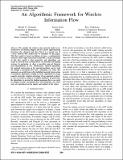An Algorithmic Framework for Wireless Information Flow
Author(s)
Goemans, Michel X.; Iwata, Satoru; Zenklusen, Rico
DownloadGoemans_An algorithmic.pdf (244.2Kb)
PUBLISHER_POLICY
Publisher Policy
Article is made available in accordance with the publisher's policy and may be subject to US copyright law. Please refer to the publisher's site for terms of use.
Terms of use
Metadata
Show full item recordAbstract
We consider the wireless relay network model as introduced by Avestimehr, Diggavi and Tse for approximating Gaussian relay channels and show that it is a special case of a more abstract flow model that we introduce in this paper. This flow model is based on linking systems, a combinatorial structure with a tight connection to matroids. A main advantage of this flow model is that properties and algorithms can easily be derived from existing theory on matroids and linking systems. In particular we show a max-flow min-cut theorem and submodularity of cuts. Furthermore, efficient algorithms for matroid intersection or for matroid partition can be used for finding a maximum flow and a minimum cut. Thus, this approach can profit from well-established matroid (intersection or partition) algorithms, leading to faster algorithms for large capacity networks. Another advantage of our approach is that it is easy to extend or adapt it to similar problems. In particular, the algorithm we present for finding maximum flows can easily be adapted to find a maximum flow with minimum costs when costs are introduced on the inputs and outputs of the relays.
Date issued
2010-01Department
Massachusetts Institute of Technology. Department of MathematicsJournal
Proceedings of the 47th Annual Allerton Conference on Communication, Control, and Computing, 2009. Allerton 2009.
Publisher
Institute of Electrical and Electronics Engineers
Citation
Goemans, M.X., S. Iwata, and R. Zenklusen. “An algorithmic framework for wireless information flow.” Communication, Control, and Computing, 2009. Allerton 2009. 47th Annual Allerton Conference on. 2009. 294-300. © Copyright 2009 IEEE
Version: Final published version
Other identifiers
INSPEC Accession Number: 11135249
ISBN
978-1-4244-5870-7